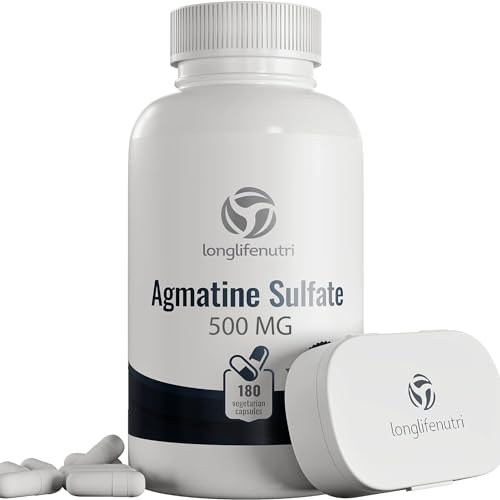Agmatine for Depression
Major depressive disorder / MDD is one of the most common mental health issues in the world with a lifetime prevalence of 20%. Depression causes more disability than any other disorder. Despite this fact, many of the pharmaceuticals that are prescribed for depression, don’t work, aren’t safe, or they have limited effectiveness. Within the context of conventional medicine, depression treatment itself it depressing and many patients must seek alternative mental health treatments on their own.One major issue with antidepressant drugs is the fact that they take a long time to begin reducing symptoms of depression. Thankfully, there are alternative treatments for depression that are safe, non-toxic, and effective. Below are several of the most valuable alternative antidepressants that are available throughout the world:
- Lithium orotate
- Methylene Blue
- Mucuna pruriens
- Kambo
- Ayahuasca
- Iboga
- Essential Oils
- More…
 Nutricost Agmatine 100 Grams - Pure Agmatine Powder 100 Servings (Agmatine Sulfate)
Nutricost Agmatine 100 Grams - Pure Agmatine Powder 100 Servings (Agmatine Sulfate)
What is agmatine?
Agmatine is a polyamine that is produced naturally in the body from L-arginine (a conditionally essential amino acid). Agmatine works as a neuromodulator with powerful antidepressant effects that function primarily through the glutamatergic system. This makes agmatine unique in terms of antidepressants. Though scientific research has shown that the glutamatergic system is involved in the development of depression, none of the most prescribed antidepressant medications target this part of the nervous system.
Agmatine has been used in combination with SSRIs with good results. It seems to enhance and modulate the effects of SSRIs. Some studies, for example, have shown that agmatine can be administered with other antidepressants such as imipramine to produce a synergistic effect. When agmatine is used with an antidepressant such as imipramine, the mechanism of action by which agmatine is able to improve its effects involves the interaction of NMDA receptors and alpha2-adrenergic receptors via the L-arginine-nitric oxide pathway.
One study showed that agmatine was able to protect cells against NMDA-induced cytotoxicity through the modulation of NMDA receptors, calcium levels, and monoamine levels.
Agmatine for Depression: Antidepressant Effects
According to the research, the antidepressant effects of agmatine seem to be due to:
- The blockade of NMDA receptors
- Inhibition of the NOS enzyme (which increases levels of nitric oxide in the body)
- Interaction with the noradrenergic system
- Interaction with the serotonergic system
- Interaction with the opioid system
- Interaction with the imidazoline system
- Inhibition of potassium channels
Agmatine Use with Antidepressants
Modulation of several biochemical pathways have been observed in relation to agmatine and all of them promote cell survival, neuroplasticity, and a corresponding positive effect on mood. The use of agmatine with the following antidepressants enhanced the antidepressant potency of these medications by 2 to 10 times:
- Fluoxetine
- Imipramine
- Bupropion
The Agmatinergic System
The agmatinergic system seems to exist to help the body and the mind adapt to stress. Agmatine works to protect nerve cells from damage during times of stress. For this reason, scientists have observed that patients with Major Depressive Disorder produce more agmatine. Blood concentrations of agmatine tend to be elevated in individuals with depression too. Essentially, it seems that the brain tries to mitigate the negative effects of stress and trauma to prevent depression naturally. Sometimes the body is able to produce enough agmatine to prevent depression from occurring, but sometimes people need to take an agmatine supplement to meet the body’s needs.
Depression is often associated with high stress and also with trauma. Agmatine has been used to alleviate the effects of stress to produce new cells in the hippocampus. A dose of 10 mg / kg body weight has been shown to be able to get rid of restraint stress-induced depression via its antioxidant activity in the brain. Even at a low dose of 2-3 mg / day for 3 to 4 weeks some scientists have been able to treat depression in their research subjects. It’s important to note here that some studies have shown that agmatine may have a biphasic dosing effect wherein lower doses have different effects than higher doses. These studies have shown that in low doses (1000 mg or less per day), agmatine is able to reduce access to negative, traumatic memories. This can be a positive thing in the initial stages of use if the patient has underlying trauma that’s causing their depression. At higher doses though (1000-3500 mg per day), agmatine enhances access to underlying traumas which allows those traumatic memories to be processed and released. Though both reduced access and processing and release of traumatic memories can be healing for those with depression, it is often best for people to work slowly into traumatic material. Thus, it may be wise to start with a lower dose of agmatine and slowly increase the dose over time.
Agmatine normalizes elevated levels of corticosterone to prevent changes in body weight that occur chronically stressed animals while protecting brain regions that can lead to chronic depression. Agmatine, like the antidepressant fluoxetine, reduces behavioral problems that happen when people are exposed to chronic, unpredictable mild stress. This substance normalizes corticosterone levels which are often elevated in patients with depression and reduce weight gain that commonly occurs with chronic stress. Scientists theorize that the up-regulation of neurogenesis in the adult hippocampus is largely responsible for these effects.
 Nutricost Agmatine Sulfate 1000mg, 120 Capsules - Gluten Free, Non GMO, 500mg Per Capsule
Nutricost Agmatine Sulfate 1000mg, 120 Capsules - Gluten Free, Non GMO, 500mg Per Capsule
Agmatine and Ketamine
Some scientists have noted a biochemical similarity in terms of mechanism of action between ketamine and agmatine which may explain agmatine’s ability to relieve depression. Many experts believe that the antidepressant activity of agmatine is due to its ability to block the NMDA receptors. This theory agrees with other studies that have shown that NMDA receptor antagonists tend to have antidepressant effects in animal models.
Several studies to date have shown that agmatine can strengthen the neuroprotective effect of subthreshold concentrations of ketamine against cell death caused by high corticosterone levels. In these studies on animal models of depression agmatine was administered 30 minutes prior to ketamine administration at the following dose:
- Agmatine: 0.1-1 mg / kg of body weight - administered by mouth
- Ketamine: 10 mg / kg body weight administered intravenously
When agmatine is administered prior to ketamine for depression, the combination resulted in improved dendritic arbor complexity and spine density. Essentially, this means that the combination of agmatine and ketamine increased brain plasticity significantly.
Note that some people have reported that agmatine with ketamine can “kill the trip” and make it less colorful and vibrant. Other people have reported the opposite effect. In either case though, the scientific research indicates that ketamine and agmatine can work together to increase brain plasticity to treat symptoms of depression more quickly.
Agmatine Dosing for Depression:
Agmatine can have different effects if you take a low dose (less than 1000 mg) versus if you take a higher dose (1000-3500 mg). If you are taking agmatine for depression, consider starting with a low dose. At lower doses, agmatine will help your brain avoid traumatic memories and fear responses that have been conditioned. If you begin at a low dose, you can increase the dose slowly over time to improve brain plasticity and your ability to deal with underlying trauma that might be causing your depression. Increase the dose over time and note the effects to find the proper dose for you.Agmatine and Lithium Orotate
NOTE: Agmatine can potentiate the effects of lithium, including both prescription drugs and natural forms of lithium such as lithium orotate. Both agmatine and lithium have an impact on mood through their interaction with NMDA receptors which explains their synergistic effect against depression. Studies have shown that a sub-effective dose of lithium at 3 mg/kg body weight combined with a sub-effective dose of agmatine (0.001 mg/kg) significant antidepressant effects have been observed in animal models of depression. Click here to subscribe to the Living Database!
Click here to subscribe to the Living Database!
Resources:

 Agmatine is able to improve brain plasticity in a manner that is comparable to ketamine. But agmatine is a natural substance with low toxicity that can be taken at home as a supplement.
Agmatine is able to improve brain plasticity in a manner that is comparable to ketamine. But agmatine is a natural substance with low toxicity that can be taken at home as a supplement. LongLifeNutri Agmatine Sulfate 500mg - 180 Veg Caps | Pre-Workout | Nitric Oxide Supplement | Strength & Focus Booster | Supports Muscle Recovery
LongLifeNutri Agmatine Sulfate 500mg - 180 Veg Caps | Pre-Workout | Nitric Oxide Supplement | Strength & Focus Booster | Supports Muscle Recovery




























